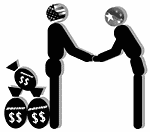AFTER HIS TALK to a business group in DC the other day, Boeing Chairman Phil Condit paused as reporters gathered round. A little diplomacy seemed in order. Boeing’s engineers were on strike, grumbling about corporate callousness and the company’s threats to subcontract more production— to China, say.
Condit, however, didn’t have a new money offer for the engineers. But he had one for Congress.
If our top elected officials would approve a permanent normal-trade status for Beijing, he said, the company would pay for those aye votes.
No fooling around. A congressional vote for Boeing’s China policy could be redeemed in campaign contributions.
It was a Kodak moment in the history of vote-buying. To stabilize China’s trade status and avoid the now-yearly congressional battles that ensue over policy renewal, Boeing and other US corporations were pulling out all the stops—and wallets.
Some observers were stunned. “Unfortunately, this kind of quid pro quo is standard operating procedure in government,” says Aaron Taylor of the DC watchdog group Citizens Against Government Waste. “What is unusual is for a company official to speak to the media about it in such explicit terms.”
The usual method is quiet backroom arm-twisting and the implication of political contributions for doing the right thing. But with the US having agreed to seek permanent trade approval as a condition for China’s entry into the World Trade Organization, the Clinton administration and American corporations face an intense vote in Congress this summer—with Condit as their advance man.
He chairs a $6-million China trade campaign on behalf of the formidable US Business Roundtable (representing chief executives from the US’s biggest companies). Boeing’s fortunes are at stake as well. Already the number one US exporter to China, Boeing expects Beijing to order $120 billion in aircraft in the next two decades.
Thus, to keep Boeing and America strong, Condit publicly announced the company was offering bucks for ballots.
“We are an issues-oriented company,” the chairman told reporters, in reference to the China vote. “We try to support people who believe in the kind of issues that we think are important for the United States. So clearly, yes, we will be supporting people that believe in the direction we do.”
There was no mistaking Condit’s public offer. It may have been the boldest ever made to Congress. “This is a bribe,” Joe Maciariello, a Claremont Graduate University business expert, says flatly—in effect, a mass payoff bid extended to 535 elected officials.
Boeing is no stranger to charges of bribery, of course. It was something the company was accused of doing under cover of darkness in foreign lands, greasing commercial jet sales with millions handed to Saudi royal families, Japanese government officials, and assorted airline potentates. In the late 1970s, the company agreed to a US consent decree following allegations it paid $52 million in bribes to foreign governments. Boeing admitted no wrongdoing. It just said it wouldn’t do it again.
But apparently it did. In a civil case still proceeding on appeals through a US court in Florida, a Canadian airplane maker has earned a $2.8 million judgment alleging in part that Boeing executives approved a $786,000 bribe on the sale of planes in the Bahamas.
It would seem prudent that Boeing today might avoid offers that smack of payoffs. But Condit didn’t even bother to lurk in a dark corner with a bag of goodies—he shouted his deal from the media rooftops.
“Generally,” says watchdog Taylor, “this type of thing is done in a sort of doublespeak that is understood by the parties involved, but vague enough to provide plausible deniability.”
Condit simply may have “unwittingly broken one of the unspoken rules of the Washington game,” Taylor adds. “I imagine that Boeing’s professional government relations people would never make this kind of statement.”
To test that theory, we asked one of the company’s public relations staff how exactly Boeing might “support” those who back its China policy. A flat amount? More for fence straddlers? Lump sums for those who cave the last moment?
Says Tim Neale, a Boeing spokesperson in DC: “Boeing’s practice is to contribute money to elected officials and to people running for public office whose interests coincide with the company’s. All information about Boeing’s political contributions is on file with the Federal Election Commission and is public record.”
In other words, no comment. But those FEC records do show that in 1997-98 Boeing gave $1.65 million to federal candidates. The latest 1999-2000 figures reflect $289,750 in contributions to House and Senate members.
Apparently, for the right vote, they can all expect more—save for Oregon Representative Peter DeFazio. Records show virtually all House members except him have gotten support from Boeing. One possible reason: He happens to strongly oppose the China trade plan. And he apparently isn’t taking up Condit’s offer.
“Our biggest export to China is family-wage American jobs,” DeFazio says in a statement issued by his office. US trade policy “coddles dictators and ignores the cries of millions of Chinese who are suffering persecution for their religious beliefs, their cultural heritage, and their political views.”
If Boeing’s bid is just a case of accidental honesty, an unguarded corporate moment, it’s no less revealing, says watchdog Taylor.
“This kind of talk underscores what we already know: The political system is in need of some serious reform.”








